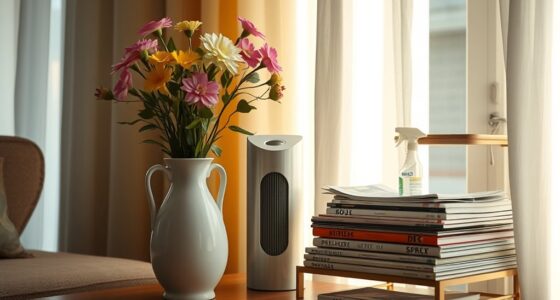The composting mistake attracting pests is using the wrong materials, such as excess dried leaves or food scraps, which draw insects and rodents. Overfeeding your pile, keeping it too wet or dry, and leaving it uncovered also create perfect pest environments. Additionally, failing to turn or aerate the compost properly leads to odors and shelter for pests. If you want to prevent these issues, understanding how to maintain a balanced, well-maintained compost pile is key.
Key Takeaways
- Using the wrong compost materials, like excess dried leaves or food scraps, attracts pests due to imbalance.
- Overfeeding the compost pile causes nutrient overload and foul odors that draw pests.
- Maintaining improper moisture levels—too dry or too wet—creates conditions appealing to pests.
- Leaving the compost uncovered or inaccessible exposes it to insects and rodents seeking shelter or food.
- Failing to turn and aerate the pile allows compaction and odors that attract pests.
Using the Wrong Compost Materials
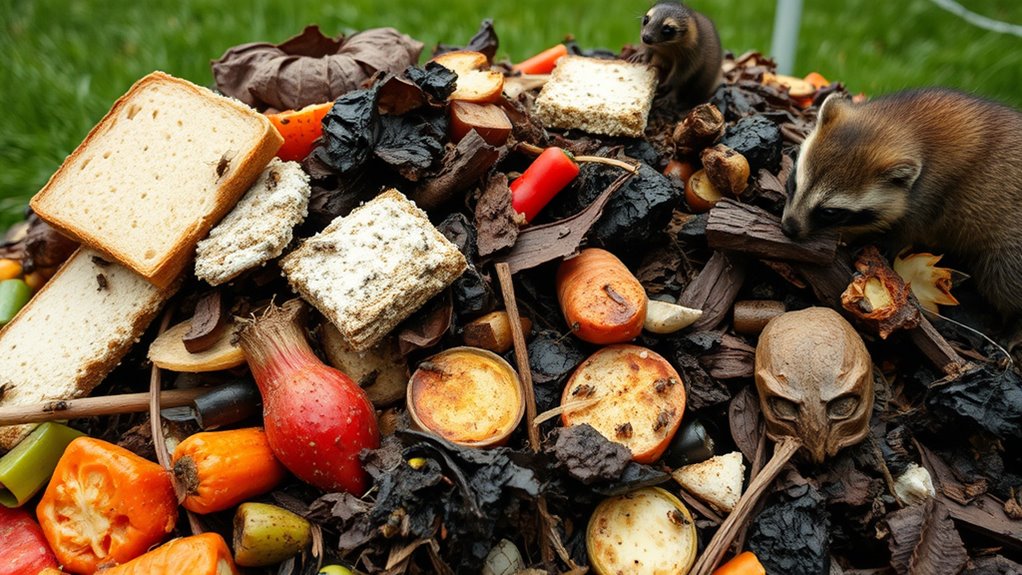
Using the wrong compost materials can quickly turn your compost pile into a pest magnet. If you include too many carbon-rich materials like dried leaves, straw, or shredded paper without balancing them with nitrogen sources such as food scraps or freshly cut grass, pests will be attracted to the pile. Carbon-rich materials provide bulk and structure but lack the nutrients pests seek. Conversely, adding excessive nitrogen sources can create a smelly, soggy environment that invites flies and rodents. To keep pests at bay, aim for a proper mix of carbon-rich materials and nitrogen sources, maintaining a balance that promotes healthy composting without attracting unwanted critters. Proper material selection and balance are key to pest-free composting. Regularly monitoring and adjusting the compost moisture level helps prevent conditions that attract pests and supports efficient decomposition.
Overfeeding Your Compost Pile

Overfeeding your compost pile can lead to problems just as serious as adding the wrong materials. When you give it excess feeding, you risk nutrient overload, which can slow down decomposition and attract pests. Too much food scraps or kitchen waste creates a smelly, attractive environment for rodents and insects. To prevent this, balance your compost by adding enough browns and greens, avoiding excess feeding. Proper compost management techniques can help maintain a healthy and pest-free compost pile.
Failing to Maintain Proper Moisture Levels
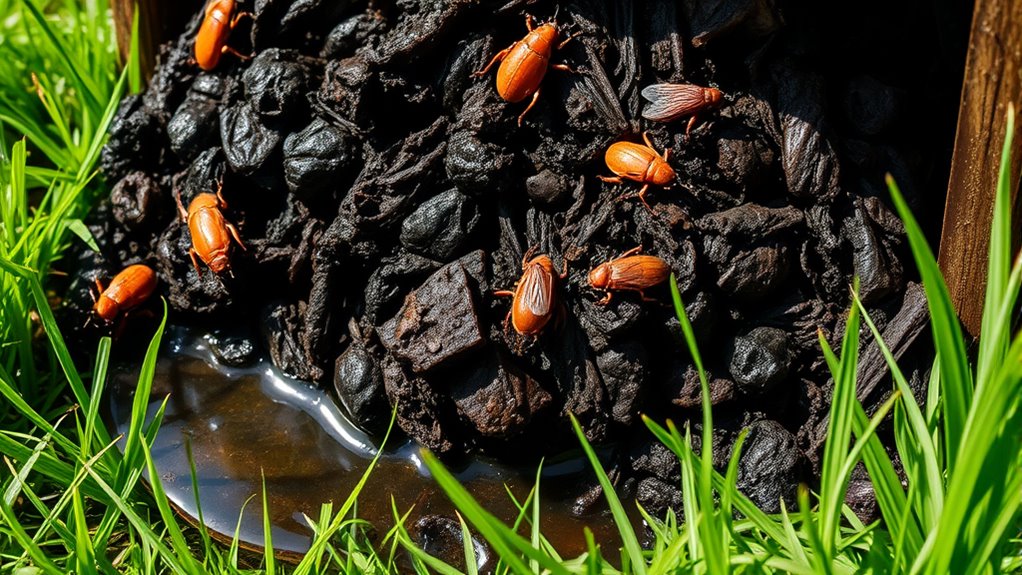
Failing to maintain proper moisture levels can disrupt the composting process and invite problems. A correct moisture balance is essential for compost hydration, ensuring microorganisms break down materials efficiently. If the pile is too dry, decomposition slows, creating a stale environment that attracts pests like rodents and insects. Conversely, overly wet compost becomes soggy, promoting mold, foul odors, and potential pest infestations. To keep moisture ideal, regularly check the compost’s dampness—it should feel like a wrung-out sponge. Add water if it’s too dry, or incorporate dry materials if it’s too wet. Proper moisture levels promote healthy compost hydration, speeding up decomposition and preventing pests from being drawn to your yard by rotting, improperly maintained compost. Maintaining the right natural materials in your compost can also help regulate moisture and improve overall decomposition.
Leaving the Pile Uncovered or Inaccessible
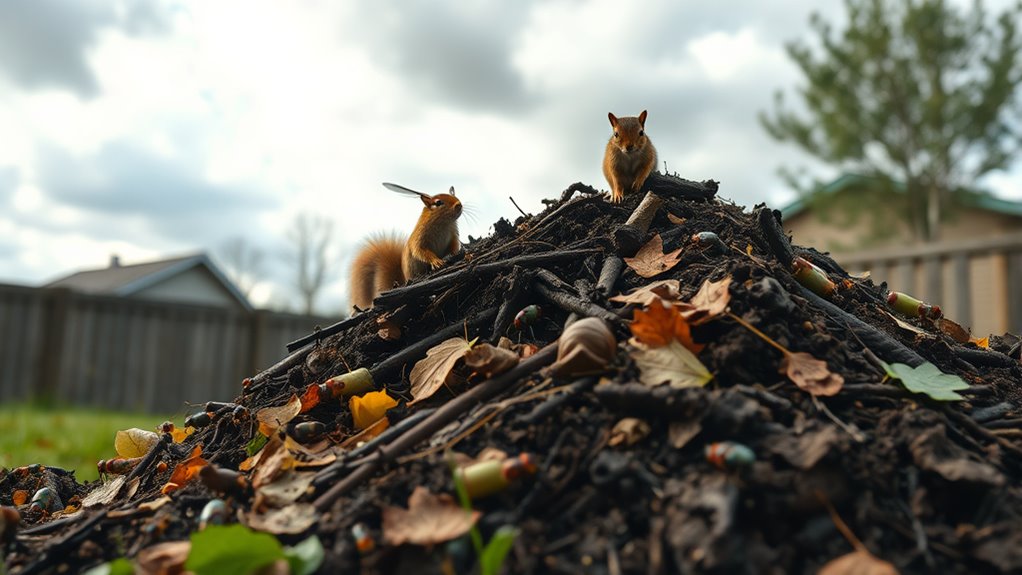
Have you left your compost pile uncovered or difficult to access? Covering neglect can turn your compost into a pest magnet, as exposed piles attract insects, rodents, and other critters. Accessibility issues also play a role; if your pile is hard to reach or poorly designed, you’re less likely to maintain it properly. Without a cover, rain can create soggy, smelly conditions that pests love. Additionally, a cluttered or hidden pile invites animals seeking food or shelter. To prevent problems, keep your compost covered with a lid or tarp, and ensure it’s easy to reach for regular turning and monitoring. Proper covering and accessibility help maintain a balanced, pest-resistant composting environment. Water efficiency in your compost setup can also reduce excess moisture that attracts pests.
Ignoring Proper Turning and Aeration Techniques
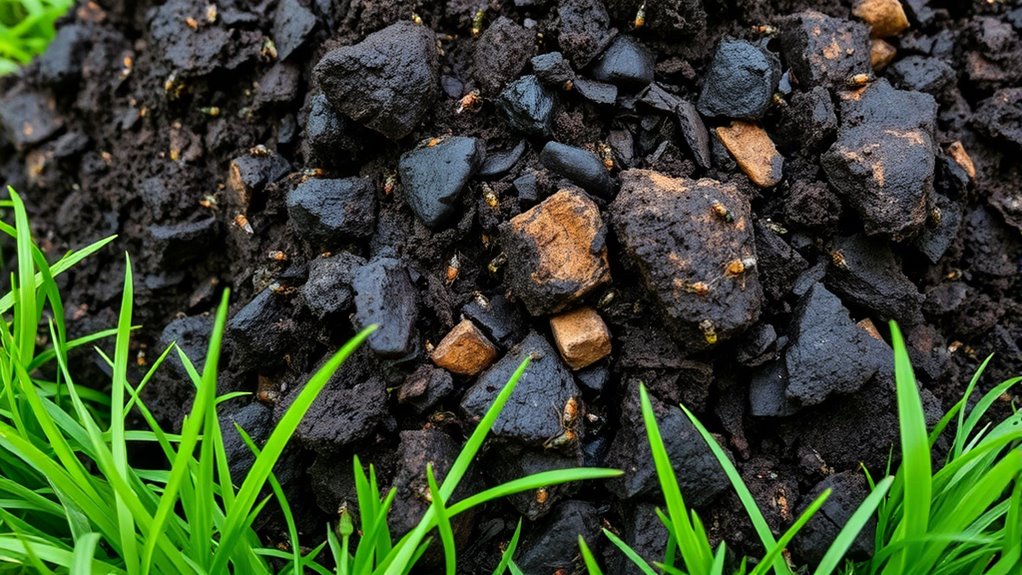
Ignoring proper turning and aeration allows compost to become compacted and oxygen-deprived, creating ideal conditions for pests and foul odors. When you neglect compost aeration, the pile can develop pest habitats, as moisture and rotting materials provide shelter for insects and rodents. Without regular turning, beneficial microbes can’t break down materials efficiently, leading to foul smells that attract pests further. Compost neglect also results in uneven decomposition, leaving pockets of decayed matter that pests find irresistible. To prevent this, you need to turn your compost regularly, ensuring proper airflow and mixing. This keeps the pile aerated, discouraging pest habitats and odor buildup. Active aeration not only speeds up composting but also helps you avoid the pest-attracting mistakes caused by neglecting these essential techniques.
Frequently Asked Questions
Can Pet Waste Be Safely Composted Without Attracting Pests?
You can compost pet waste, including dog waste and pet urine, but you need to do it carefully. Use a dedicated, sealed compost bin designed for pet waste to prevent pests. Bury the waste deep in the pile, keep it hot, and avoid adding it to your vegetable garden. Properly managed, composting pet waste reduces pests and odors while safely recycling nutrients.
How Does Composting Impact Local Wildlife and Pest Populations?
Composting can impact local wildlife by causing habitat alteration, which may disturb their natural behaviors. When you compost improperly, it attracts pests that can threaten native species and disrupt ecosystem balance. Wildlife disturbance occurs as animals seek food from your compost, potentially leading to conflicts or dependency. To minimize these effects, you should use secure bins, avoid adding attractants, and maintain proper composting practices to protect local habitats and keep wildlife undisturbed.
Are There Specific Pests Attracted to Certain Compost Materials?
Imagine a lush garden inviting tiny visitors; certain compost ingredients can act like magnets for pests. You might notice that meat scraps or oily foods, when added as compost ingredients, increase pest attraction. These items attract critters like flies, rats, or ants, turning your compost pile into a pest hub. To keep your yard harmonious, stick to plant-based scraps and avoid tempting pests with certain compost ingredients.
What Are the Best Ways to Prevent Pests in Outdoor Compost Bins?
To prevent pests in your compost bin, focus on choosing a pest-resistant design and materials. Use a bin with a tight-fitting lid and guarantee proper ventilation to deter critters. Avoid adding meat, dairy, or oily foods that attract pests. Regularly turn your compost to prevent odors and keep pests away. Also, opt for pest-resistant materials like plastic or metal, which are harder for pests to penetrate and access.
How Long Does It Take for Pests to Invade an Improperly Maintained Compost?
Pest invasion in an improperly maintained compost can happen surprisingly fast, often within a few weeks. The composting timeline plays a key role—you create a perfect environment for pests when you leave it too wet, add meat or dairy, or neglect turning it regularly. These mistakes give pests easy access and attract them quickly, sometimes in as little as 2-3 weeks. Staying attentive and maintaining proper composting habits helps prevent pests from invading.
Conclusion
By avoiding common composting mistakes like using the wrong materials or neglecting aeration, you can keep pests at bay and create healthy compost. Did you know that 30% of household waste is compostable? Proper maintenance not only reduces pest attraction but also turns waste into valuable soil. So, stay mindful of moisture, turn your pile regularly, and cover it when needed. With a little effort, you’ll have a pest-free yard and nutrient-rich compost in no time.



